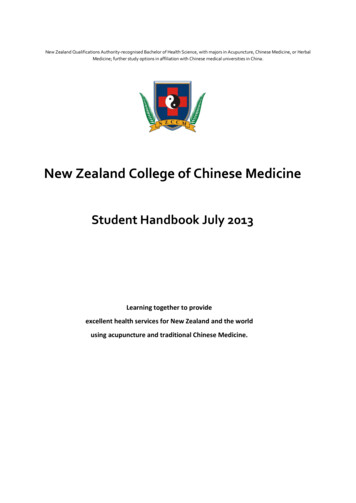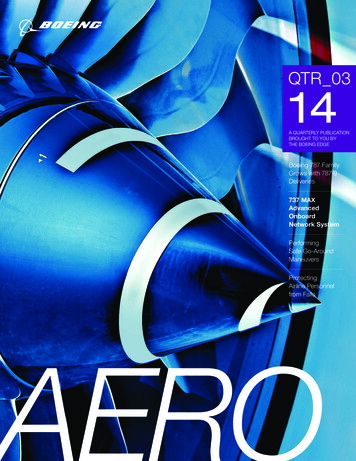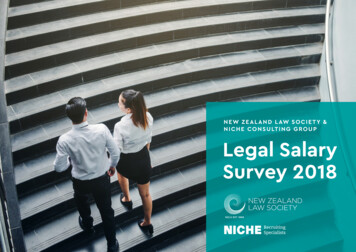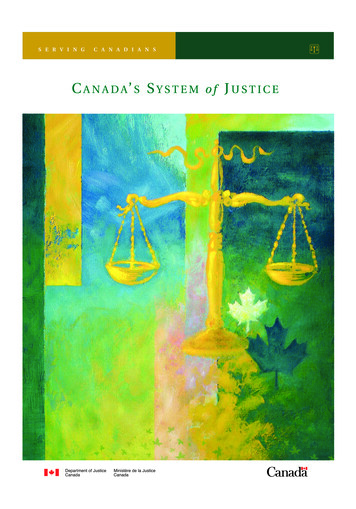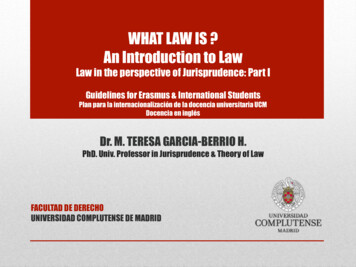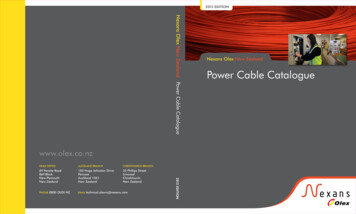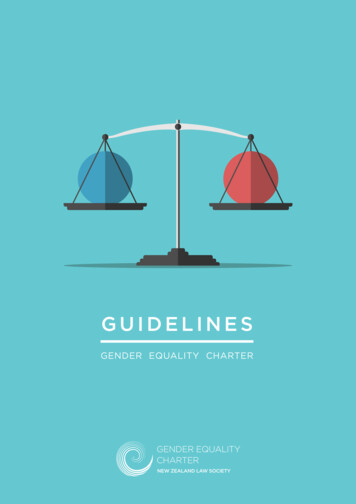
Transcription
GUIDELINESGENDER EQUALITY CHARTERGENDER EQUALITYCHARTERNEW ZEALAND LAW SOCIETY
GUIDELINESGENDER EQUALITYCHARTERGENDER EQUALITY CHARTERNEW ZEALAND LAW SOCIETYPurposeIn April 2018, the New Zealand Law Society published a Gender Equality Charter for the legal profession.These guidelines explain: why the legal profession needs a Gender Equality Charter the benefits of signing up how charter signatories can meet charter commitments, and how to sign up.WHY THE LEGAL PROFESSIONNEEDS A GENDER EQUALITYCHARTERBENEFITS OF SIGNING UPTO THE GENDER EQUALITYCHARTERGender equality is critical to the success and sustainabilityof the legal profession. The business case for havingmore women on boards and executive positions is wellestablished. Studies have shown that teams of mixedgender can lead to improved decision-making andultimately lead to increased productivity and profitability.Gender equality in leadership also plays an importantrole in creating safe working environments whereeveryone can flourish. Research shows that harassmentis more prevalent in workplaces where men dominate inmanagement.Signing up to the charter enables signatories to makea public statement of their commitment to improvinggender equality and inclusion. A list of signatories willbe published on the New Zealand Law Society’s (the LawSociety) website.However, women are severely underrepresented insenior legal roles in the legal profession. Over 60% oflaw graduates and just over half of the legal professionis female. Yet, while women make up 61% of lawyerswho work in law firms with more than one practitioner,they make up less than 31% of partners or directors inthose firms. Although around 60% of in-house lawyersare women, that proportion is not reflected in leadershiproles in corporate and government legal teams. And only26 out of 110 Queens Counsel appointed since 2002 arewomen. The hourly charge out rate for women is lowerthan males by an average of 7% to 10% in all sizes of firmand virtually all areas of the country.The New Zealand Law Society’s Women’s Advisory Panelhas developed a Gender Equality Charter (the charter) toimprove the retention and advancement of women in thelegal profession. The charter enables the legal professionto voluntarily commit to taking joint action to addressthis visible and longstanding problem. The charter isopen to the whole legal profession. Law firms, in-houselegal teams, sole practitioners (including barristers sole)and barristers’ chambers can all sign up to signal theircommitment to gender equality and inclusion.Charter signatories will be able to use the logo below ontheir communications and marketing.GENDER EQUALITYCHARTERCharter signatories will be part of a community committedto improving gender equality and inclusion that will lead,develop and share best practice for the benefit of thelegal profession.While this charter focuses specifically on gender equalityand inclusion, some charter commitments, e.g., onunconscious bias, are also relevant to other aspects ofdiversity. The charter is only one part of the Law Society’sbroader programme of work on diversity in the legalprofession. A review of the charter will be commencedwithin two years with a view to incorporating otheraspects of diversity.
GUIDELINESGENDER EQUALITY CHARTERPRINCIPLES UNDERPINNING THEGENDER EQUALITY CHARTERSome key principles underpin the charter. The charter is designed to support and encouragethe legal profession to improve the retentionand advancement of female lawyers. The charter is for all of the legal profession,from sole practitioners (including barristers),smaller law firms, barristers’ chambers tolarge law firms and in-house legal teams. The charter is focused on areas that will makea real difference in improving the retention andadvancement of women in the legal profession. The charter is designed to help improve cultureand is not a tick box compliance exercise. The charter is designed so that signatoriescan choose the best way to meet chartercommitments according to their needs. Administrative reporting requirements are notonerous and intrusive but focus on key metricsto measure overall progress in improving genderequality and inclusion in the profession.THE CHARTER COMMITMENTSBy signing up to the charter, signatories commit to: Lead from the top Make a plan and take action Measure progressGENDER EQUALITYCHARTERNEW ZEALAND LAW SOCIETY1. LEAD FROM THE TOPAssign responsibility for meeting chartercommitments to a named, senior levelindividualCharter signatories need to assign responsibility formeeting charter commitments to a senior namedindividual. A senior named individual is someone in aleadership role. This may include a lawyer practising onown account, a chief legal officer or HR director. Thisperson will also be responsible for: Completing an online baseline survey Regularly sharing examples with the Law Societyof practical action that has made a real differenceto gender equality and inclusion, and Reporting on progress every two years (viaan online survey) to the Law Society.2 . M A K E A P L A N A N D TA K EAC T I O NImplement unconscious bias training forall lawyers and key staff and take action toaddress identified biasEveryone has biases shaped by their social environment,background and personal experiences. Some biasesare conscious, such as choosing to hire individuals witha certain amount of experience. Unconscious bias iswhen a person is unaware that they have certain inbuiltpreferences and is unaware how these preferencesinfluence their behaviour and decisions.This charter commitment requires all lawyers and keystaff (defined as staff responsible for the recruitment,retention and promotion of lawyers) to completeunconscious bias training. The purpose of this training isto help lawyers understand their own unconscious biasand employ strategies to minimise unconscious bias inthe workplace.Training can take many forms. For example, NZLS CLE Ltdhas a free webinar on unconscious bias in the workplaceand accompanying booklet. This webinar and bookletcould be part of an induction pack for new lawyers. Moresenior lawyers and key staff (i.e. those responsible for therecruitment, retention and promotion of lawyers) mightbenefit from a tailored workshop.
GUIDELINESGENDER EQUALITYCHARTERGENDER EQUALITY CHARTERFor further information and resources on unconsciousbias please have a look at the women in law section ofthe Law Society website.Conduct annual gender pay audits and takeaction to close any gender pay gapThe gender pay gap is a high-level indicator of thedifference between women’s and men’s earnings. Itcompares the median hourly earnings of women and menin full and part-time work.On 1 September 2017, Statistics New Zealand announcedthat the gender pay gap in New Zealand was 9.4%.Recent research by the Ministry for Women found thatin New Zealand a great majority (80%) of the genderpay gap is now driven by harder to measure factors, likeconscious and unconscious bias that impacts negativelyon women’s recruitment and pay advancement, anddifferences in choices and behaviours between men andwomen.A gender pay audit is the process of assessing whetheryou have a gender pay gap, identifying causes and, ifnecessary, making a plan to close the gender pay gap.NEW ZEALAND LAW SOCIETYThe Ministry for Women has published a guide foremployers on how to conduct a gender pay audit. Andthe Workplace Gender Equality Agency in Australia hassome useful tools for conducting a gender pay audit,including a gender pay gap calculator.For further information and resources on gender payaudits please have a look at the women in law section ofthe Law Society’s website.Encourage and support flexible working toassist all lawyers to balance professional andpersonal responsibilitiesThis charter commitment is about making flexible workingavailable to all lawyers, not just female lawyers or thosewith caring responsibilities, and creating a culture wherelawyers are not disadvantaged in their careers, eitherdirectly or indirectly, if they access flexible workingarrangements.Charter signatories may wish to extend this commitmentto all employees not just lawyers.For further information and resources on flexible workingplease have a look at the women in law section of LawSociety’s website.Gender pay gaps can be calculated in a number of ways: Organisation-wide: The difference in paybetween all male and all female lawyers andthe number of male and female lawyers. By level: The difference in pay between menand women at similar levels or pay bands (e.g.senior associate) and the number of men andwomen at each level (e.g. the number of menand women at senior associate level).Regularly review areas of our practice with agender equality and inclusion lensThis charter commitment is about taking the time to stepback and reflect on areas of your practice to understandwhether these support and encourage gender equalityand inclusion.Areas to review could include: Like for like: The difference in pay betweenmen and women doing similar work (e.g. seniorassociates in a particular team) and the numberof men and women doing similar work (e.g. thenumber of male and female senior associates). recruitment, retention, promotion policies and practicesIn addition to gender pay audits, a broader range of dataand evidence can be analysed by gender e.g. promotionand salary progression, performance ratings to reviewwhether there is a gender gap, identify the causes and, ifnecessary, make a plan to close the gap. teams in different areas of practiceCharter signatories may wish to conduct gender payaudits for all employees, not just lawyers. how they instruct juniors, co-counsel or other lawyers publications tendering for new work seminars and education events measures of success that move away fromrewarding staff for time spent in the officeSole practitioners may wish to consider reviewing areassuch as: how they make referrals to counsel or other lawyers
GUIDELINESGENDER EQUALITY CHARTERAdopt equitable instruction and briefingpracticesThis charter commitment is about increasing the numberof women lawyers with relevant expertise who take a leadon court proceedings, arbitral proceedings, and majorregulatory investigations.This could be achieved in a number of ways: when considering a new engagement or instruction,use reasonable endeavours to identify femalelawyers in the practice area relevant to the matter genuinely consider engaging or instructing(or, where relevant, recommending) femalelawyers to represent the client in that matter use reasonable endeavours to ensure thatthere is gender equality in the assignmentof major internal pieces of work regularly monitor and review the level of engagement,instruction or recommendation of female lawyers adopt an equitable instruction policy such as theGender Equitable Engagement and InstructionPolicy which requires policy adopters to usereasonable endeavours to have women lawyerswith relevant expertise take a lead on at least30% of court proceedings, arbitral proceedings,and major regulatory investigations.Actively work to increase gender equalityand inclusion in senior legal rolesThis charter commitment is about signatories beingproactive about managing the talent pipeline to increasegender equality and inclusion in senior legal roles (definedas equity partners or directors, general counsel or chieflegal officers)Barristers and sole practitioners could meet thiscommitment by considering gender equality when theyare allocating work to juniors or referring work.Charter signatories may wish to consider setting targets.The Workplace Gender Equality Agency in Australia hasa target setting toolkit, which includes a target settingcalculator.GENDER EQUALITYCHARTERNEW ZEALAND LAW SOCIETY3. MEASURE PROGRESSCollect and share with the New Zealand LawSociety examples of practical approaches togender equality and inclusion that make areal differenceCharter signatories are encouraged to share examplesof practical approaches that have made a real differencewith the rest of the legal profession to help develop bestpractice. These will be communicated to the professionon an ongoing basis via LawPoints, LawTalk and the NewZealand Law Society’s website.The Law Society will check in with charter signatoriesevery six months or charter signatories can contact theLaw Society with examples at any time by emailing:womeninlaw@lawsociety.org.nz. Signatories do not haveto provide information if they do not have examples thatthey wish to share.Report on progress against chartercommitments every two years to the LawSocietyCharter signatories will be asked to complete a shortonline baseline survey when they sign up and anotheronline survey biennially. The Law Society will use thisinformation to compile an overall progress report toenable the profession to regularly track its progress inimproving gender equality and inclusion.The report will contain aggregated data, and individualcharter signatories will not be identified. The onlyexception to this is where consent has been given forcase studies describing practical action taken to improvegender equality and inclusion.See Attachment A for a list of information that chartersignatories will be asked to provide to the Law Society.The survey will ask charter signatories for data on female,male and gender diverse lawyers. Gender diverse isdefined by Statistics New Zealand as having a genderidentity or gender expression that differs from a givensociety’s dominant gender roles. This category is includedin the information and data to be collected from chartersignatories to recognise that gender is not binary.The definition of gender diverse is set out in the StatisticsNew Zealand standard on gender identity. Data for thegender diverse category should only be provided bycharter signatories if it is already collected.
GUIDELINESGENDER EQUALITYCHARTERGENDER EQUALITY CHARTERA useful guide for employers on collecting data on sexualorientation and gender identity has been published byStonewall (Do Ask Do Tell).FREE ONLINE TOOLS ANDRESOURCESThe Law Society has developed a new women in law sectionon its website with links to free online tools and resourcesto help charter signatories meet their commitments. Newtools and resources will be added over time.We welcome feedback and ideas – please send these to:womeninlaw@lawsociety.org.nz.H OW TO S I G N U PSigning up to the charter is easy. The senior namedindividual responsible for meeting charter commitmentsjust needs to send an email to: womeninlaw@lawsociety.org.nz with the subject line: Sign me up.NEW ZEALAND LAW SOCIETYH O W W I L L T H E I N F O R M AT I O NYO U P R O V I D E T O T H E L AWSOCIETY BE USED?The Law Society plans to publish a report every two yearson the overall progress of the profession in improvinggender equality and inclusion. As noted earlier, the reportwill contain aggregate level information and data andindividual charter signatories will not be identified. Theonly exception to this is where consent has been given forcase studies describing practical action taken to improvegender equality and inclusion.W H AT H A P P E N S I FS I G N AT O R I E S D O N O T M E E TCHARTER COMMITMENTS?If charter signatories do not consider that they have metcharter commitments or do not report on progress theywill be removed from the list of signatories on the LawSociety website. They will not be able to use the charterlogo in their communications and marketing.W H AT I N F O R M AT I O N N E E D ST O B E P R O V I D E D T O T H E L AWSOCIETY?QUESTIONS?Email us at:womeninlaw@lawsociety.org.nzAfter signing up to the charter, signatories are requiredto:Call us on: 64 4 472 7837Write to us at:PO Box 5041,Wellington 6140, New ZealandDX SP20202Fax: 64 4 473 7909 complete an online baseline survey regularly share examples with the Law Society ofpractical action that has made a real differenceto gender equality and inclusion, and report on progress every two years (viaan online survey) to the Law Society.Attachment A lists the information that charter signatorieswill be asked to provide to the Law Society.If you have any questions please contact the Law Society:
GUIDELINESGENDER EQUALITY CHARTERAT TA C H M E N T AInformation that charter signatories will beasked to provide to the New Zealand LawSociety to help us track progress of the legalprofession in improving gender equality andinclusionThe online baseline survey (which will be repeated everytwo years) will ask for the following information fromcharter signatories: Contact details for senior named individualresponsible for implementing charter commitments Place of work Number of lawyers by gender and PQE (ieyears of practice after admission) Whether lawyer and key staff haveparticipated in unconscious bias training Types of unconscious bias training Whether a gender pay audit has been conducted Where a gender pay gap exists what actionhas been taken to close the gap Whether flexible working arrangementsare available to all lawyers Uptake of flexible working arrangementsby type of arrangement Areas of your practice that have been reviewedwith a gender equality and inclusion lens Actions taken as a result of these reviews and impact Actions taken to increase gender equalityin senior legal roles and impact Number of lawyers in senior legal roles by gender Whether and how equitable instruction andbriefing practices have been adopted Other examples of practical action that has made areal difference to gender equality and inclusion.GENDER EQUALITYCHARTERNEW ZEALAND LAW SOCIETY
has developed a Gender Equality Charter (the charter) to improve the retention and advancement of women in the legal profession. The charter enables the legal profession to voluntarily commit to taking joint action to address this visible and longstanding problem. The charter is open to the whole legal profession. Law firms, in-house

